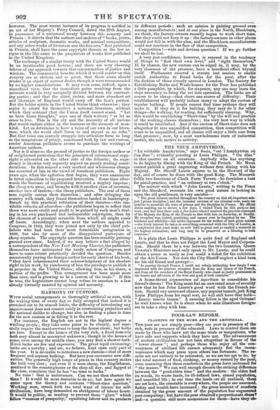HARMONY OF CUSTOMS.
WITH social arrangements so thoroughly artificial as ours, with the waking time of every day so fully occupied that indeed it is Stretched out to its utmost limits, the difficulty of introducing any in3provement does not consist solely in overcoming prejudices and the national dislike to change, but also in finding a place in time for the new custom or in fitting it to the rest. Tor instance, the English are not in the highest degree a ttaihing people • they take some pains to he cleanly, and espe- cially require the maid-servant to keep the house clean • but baths are rare. Except in the homes of the very rich, a fixed domestic t■ath may almost be accounted unknown; though in the houses of some, even among the middle class, you may find a shower-bath. Hired baths are few and expensive. The great tepid swimming- baths are a novelty ; and are, we believe, kept open only part of the year. It is desirable to introduce a new custom—that of more frequent and copious bathing. But here you encounter new diffi- etilties. The generally high range of prices in this country makes the bath very dear ; and even if it were cheap, the Englishman, confined to the countinghouse or the shop all day, and fagged at the close, complains that he has "no time to bathe."
No time 1 that is unfortunate. Can we not then shorten the time It would be most desirable to do so ; but here again we enter upon the thorny and intricate "Short-time question." Working men, struck with the total want of leisure for self- civilization, have long demanded an abridgment of labour hours. It would be politic, as tending to prevent those " gluts " which follow "seasons of prosperity," equalizing labour and its products in different periods ; such an opinion is gaining ground even among manufacturers ; and at one place in the North, Blackburn, we think, the factory-owners recently began to work short time. But they could not keep it up : the factory-owners in other places would not fall in with the plan, and the Blackburn manufacturers could not continue in the face of that competition.
Competition l—wide and devious question I If we go further we shall be lost.
A very just confidence, however, is reposed in the tendency of things to "find their own level," and "right themselves." If, by chance, the new custom can be edged in, it may, by the very closeness of the pressure, have a beneficial effect beyond itself. Parliament enacted a statute last session to enable parish authorities to found baths for the poor, after the the fashion of those already opened in London. The Society for Establishing Baths and Wash-houses for the Poor has published a little pamphlet, by which, for sixpence, any one may learn the steps necessary to bring the act into operation. The baths are of course to be cheap—that closes one source of difficulty. Their establishment will probably induce many to adopt the custom of regular bathing. If people cannot find time perhaps they will make it. If they do it for bathing, they may do it for other things—for walking, for reading, for sufficiently sleeping. Why, this would be establishing "Short-time" by the will and practice of the working classes themselves ; the very best way in which it could be established. And if the custom of Short-time does not altogether fit into unqualified competition, then competition will cease to be unqualified, and all classes will enjoy a little ease from that. pressure ; now, by a most unwholesome state of industrial morals, the sole motive to activity.


























 Previous page
Previous page